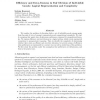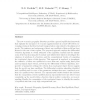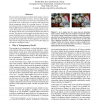281 search results - page 3 / 57 » A revealed preference approach to computational complexity i... |
JAIR
2008
13 years 7 months ago
2008
We consider the problem of allocating fairly a set of indivisible goods among agents from the point of view of compact representation and computational complexity. We start by ass...
AMC
2007
13 years 7 months ago
2007
The new economic geography literature provides a general equilibrium framework that explains the emergence of economic agglomerations as a trade-off between increasing returns at...
AAMAS
2010
Springer
13 years 7 months ago
2010
Springer
This paper investigates cooperative search strategies for agents engaged in costly search in a complex environment. Searching cooperatively, several search goals can be satisfied w...
GECCO
2010
Springer
13 years 8 months ago
2010
Springer
This paper takes an economic approach to derive an evolutionary learning model based entirely on the endogenous employment of genetic operators in the service of self-interested a...
ICCV
2003
IEEE
14 years 1 months ago
2003
IEEE
The perception of transparent objects from images is known to be a very hard problem in vision. Given a single image, it is difficult to even detect the presence of transparent o...



